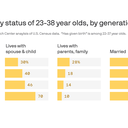How millennials are redefining the traditional family setup

Published Date: 5/27/2020
Source: axios.com
Reproduced from Pew Research Center; Chart: Axios VisualsAs the first millennials approach 40, the way the generation has defined home continues a decades-long transformation of the stereotypical American family, according to a new analysis by Pew Research Center. The big picture: For the largest living generation, trends that began with Generation X and Baby Boomers have become the new norm — including living with parents deep into adulthood, sharing homes with partners without marriage, single-parenting and delayed childbirth. Millennial men also are more likely to marry women with more education compared to past generations.And 13% of Millennials married someone of a different race or ethnicity — up from 9% during Gen X's younger years. Living situations vary significantly by educational attainment, race and ethnicity, the study finds. Among millennials, African Americans are less likely than whites, Hispanics or Asians to live in homes with a spouse and a child.Nearly half of millennial moms without a college education are unmarried, while that's true for only about one in seven with a degree.The state of play: "The change is really in what we would think of as a traditional family setup," Pew's director of social trends research Kim Parker tells Axios.Unlike previous generations at the same age, a majority of millennials (56%) aren't married. Only 42% live with a child of their own, while in past generations that was true for between half and three-fourths.Meanwhile, a striking 14% still live with their parents. Another 14% live with "other" family members, which includes siblings, grandparents, cousins or unmarried partners. That 28% of millennials living with family is up from 18% for Generation X time and 14% for Baby Boomers.Millennial men without a college degree are particularly prone to living with parents— 21% of them do so. The bottom line: This trend didn't reverse even as the economy recovered from the Great Recession, suggesting a deeper cultural shift rather than just a temporary economic decision, Parker said.